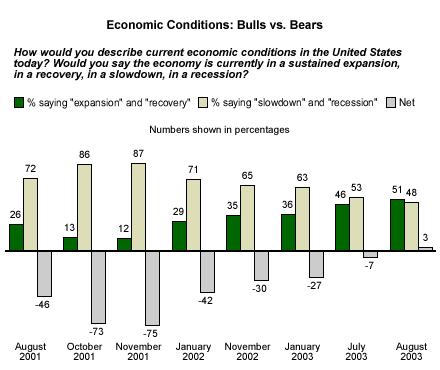The National Bureau of Economic Research (NBER) announced in July that the recession that followed the collapse of the dot-com bubble has been over for nearly two years. The NBER, America's "arbiter of recessions," dated that recession as lasting just eight months -- from March to November 2001 -- implying that the economy has been inching toward recovery ever since. In contrast, the results of the most recent UBS/Gallup Index of Investor Optimism survey* show that almost half of American investors believe that the economy is still slowing down or in recession. In other words, nearly two years after the recession's official end, 48% of investors do not believe the economy is in recovery.
Good News on the Margin
The good news is that, though almost half of investors remain bearish about the state of the economy, the tide of sentiment is turning. Fifty-one percent of investors are bullish, believing that the economy is in expansion or in recovery -- up from 36% in January 2003 and just 12% in November 2001.

With growing business and consumer spending, strong corporate profits, and increased productivity growth, the equity markets have been rallying on the backs of strong economic releases. Results of the UBS/Gallup current economic conditions question mirror these positive economic signs -- this is the first time since August 2001 that there is a net positive margin (3%) of bullish investors over bearish investors.
The Bears: More Than Two Years Before Recovery
While the consensus among economists was that payrolls would increase by 12,000 in August, the Labor Department announced last week that business payrolls outside the farming sector declined by 93,000. The fact that the recovery remains insistently jobless is surely helping sustain the significant number of American investors bearish about the future of the economy. The August UBS/Gallup survey reflects that more than one-fourth of investors (26%) expect that it will be more than two years before an economic recovery begins.

Bottom Line
The NBER, in announcing that the recession was officially over, was banking on strong GDP growth to result in job creation. Yet 22 months after the recovery officially began, job growth still remains elusive. Last month, Federal Reserve Chairman Alan Greenspan commented: "Obviously if you continue GDP growing and employment declining, at the end of the day everything is being produced by nobody." But regardless of why this jobless recovery is continuing, until increased GDP and productivity deliver on the promise of jobs, American investors will not recognize this "official" recovery as real.
*Results for the Index of Investor Optimism -- U.S. are based on telephone interviews with a randomly selected U.S. sample of 803 adult investors, aged 18 and older, with at least $10,000 of investable assets, conducted Aug. 1-14, 2003. For results based on these samples, one can say with 95% confidence that the maximum error attributable to sampling and other random effects is ±4 percentage points. In addition to sampling error, question wording and practical difficulties in conducting surveys can introduce error or bias into the findings of public opinion polls.

